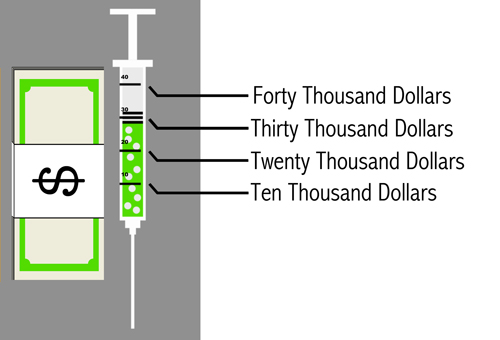
If you’re not familiar with Breaking Bad, first of all, get Netflix and watch it. Second of all, you should know it’s the story of Walter White (played by Bryan Cranston), a high school chemistry teacher diagnosed with lung cancer who puts his scientific skills to use creating a new form of blue-colored methamphetamine. His shiftless former student, Jesse Pinkman (played by Aaron Paul), indoctrinates him into the drug business.
The last five seasons have been devoted to the slow-growing meth empire they’ve built together, as well as Walt’s transition from middle-class defeatist to amoral megalomaniac. Cranston has won three Emmys for his performance, and Paul has won two.
I have a close family member who is a recovering meth addict. I was always impressed by the incredible accuracy of Jesse Pinkman’s world. Most “tweakers” I’ve met are poor, uneducated white kids. They really do call themselves things like “Combo,” “Badger,” and “Skinny Pete”—nicknames that should belong to characters in Peter Pan.
In season two’s “Peekaboo” episode, Jesse goes to confront a heavily addicted couple who ripped him off and finds their severely neglected young son living in squalor. That episode always gets to me because I know that there are many children living in those conditions right now in the neighborhood where I grew up. No doubt here in Portland, too.
But to its credit, Breaking Bad has never really been about drug use or drug addiction as much as it’s about the addiction to money. “Are we in the meth business or the money business?” Jesse famously asks Walt in season five.
The show premiered on Jan. 20, 2008. The Great Recession we’ve all been dealing with for the past five years began in December 2007. Just last week, President Barack Obama gave a speech declaring the recession over. Walter White’s story has turned out to be roughly the same length.
Since early 2008, there have been dozens of television nods to the “new normal” caused by the Great Recession. Everything from Storage Wars to 2 Broke Girls has painted a picture of debt, struggle and the wacky lengths sitcom characters will go to to put food on the table.
As someone who grew up poor, I admit I tend to roll my eyes at these attempts to dramatize financial problems. Alyssa Rosenberg wrote an interesting piece about this for political blog Think Progress last year. She talked about Ponzi schemes used as dramatic plot points, characters paying their student loans off with a party and a plethora of unrealistic depictions of the complicated issues facing real Americans.
But cable, as usual, is much closer to getting things right. Even though shows like Shameless and Weeds feature some highly unrealistic situations, there’s still an undercurrent of authenticity. Even the symbolism of a collapsed society full of zombies in The Walking Dead has the ability to speak to our times.
Breaking Bad might be the best example of recession-era television. Walt is potentially a genius who missed his chance to be part of a multibillion dollar corporation. His potential, not as a chemist but as a bread-winner, was never realized. His ability to make money is tied to his self-worth from the beginning.
Mounting medical bills frequently come into play on the show. Not only is Walt afraid to die and leave his pregnant wife and disabled son penniless, but the cost of his treatment would be way more than they could bear. Many families have probably gone through similar experiences, burdened with the knowledge that you can’t be diagnosed with a serious illness in this country without you and your family incurring an incredible amount of debt.
The issue of who is going to finance the medical expenses comes up again in season four, when Walt and his wife, Skyler (Anna Gunn), devise a cover story so they can pay for physical therapy for Hank (Dean Norris) after he is gravely wounded by agents of a Mexican drug cartel. Hank works for the Drug Enforcement Agency, and yet the only way he can get the care he needs is with hundreds of thousands of dollars of meth money.
Last season, it was Skyler’s revelation of a storage locker full of Walt’s money that caused him to finally reconsider his line of work. Breaking Bad has many themes, but the corrupting power of cash seems to be one of the biggest ones. How much is too much? Is your humanity inevitably corroded if you belong to the 1 percent of people who have more money than they could ever spend?
It remains to be seen whether America will actually learn anything from the Great Recession. But for the last five years, Breaking Bad has been smart and superb at asking the right questions. Man, I’m really going to miss it.

